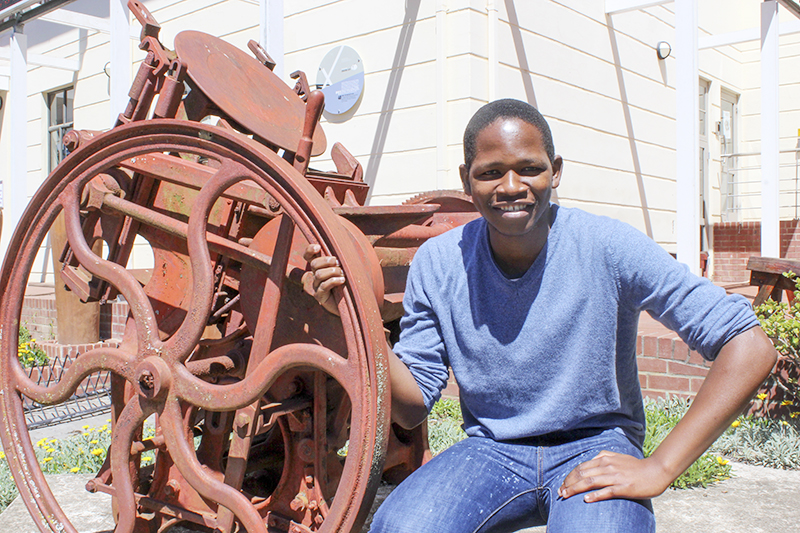Chemistry Masters student Zweli Hlatshwayo reckons students are among the most creative thinkers around and he’s thrilled to be the 2017/18 Director of the Rhodes University leg of the Hult Prize.
Saturday is D-Day for Rhodes students vying for recognition in the world’s largest student testing ground for budding social entrepreneurs. The annual competition for the Hult Prize has been named by TIME Magazine as one of the top five ideas changing the world. Run in partnership with the United Nations, it runs for a year at a time, aiming to identify and launch the most compelling social business ideas – start-up enterprises that tackle serious issues faced by billions of people.
From more than 50 000 applications received in a year, one winning team will receive US$1 milllion in seed capital, as well as mentorship and advice from the international business community.
Ideas are sourced from MBA and university students after challenging them to solve a pressing social issue on topics such as food security, water access, energy, and education. The Hult family – founders of Education First donates US$1 million in seed capital to help the winning team launch a social enterprise. The prize is a partnership between Hult International Business School and the Clinton Global Initiative (CGI).
“Students need to come up with ideas that not only address a social challenge, but also make money in the process to sustain lives – that’s part of the definition of social entrepreneurship,” Hlatshwayo says.
“The year before last, a group had the idea of using insects as food – something a lot of us wouldn’t have thought possible. It started slow and now it has a cash flow of R40m a year. They were able to achieve that with the support of the US$1m that they won.
“It’s these kinds of seemingly simple ideas, that could be available to someone sitting at home not doing anything. They can use those simple ideas to make money. So here at Rhodes, students have the opportunity to come up with ideas to solve a number of problems for the community of Grahamstown.”
Education is the first problem to solve in Grahamstown, Hlatshwayo says.
“Although some schools are doing very well, several aren’t in terms of producing students who don’t get through to University.
“Poverty and unemployment are other problems in Grahamstown. Students could come up with ideas that unemployed people could use to sustain themselves, financially and otherwise.”
Students are very creative, Hlatshwayo reckons. “Until you give them the space to think, you may never realise how creative they are.”
He says he’s confidence that Rhodes students are capable of winning the prize.
“I’ve spoken to a number of entrepreneurs here at Rhodes,” Hlatshwayo says. “The ideas are there. I’ve met a lot of bright minds at Rhodes from different fields – commerce, humanities, journalism – they’re just amazing students.
“I believe success is when a great opportunity meets great potential and at Rhodes University we have a lot of bright minds that have what it takes to change the world.”
As Hult Prize Campus Director at Rhodes University, Hlatshwayo’s job is to organise and implement a quarterfinal round of the competition on campus. The competition will include at least 10 student teams. The winning team goes through to one of 15 regional finals happening around the world next March. One winning team from each host city will then move on to a summer business incubator, where participants will receive mentorship, advisory and strategic planning as they create prototypes and set-up to launch their new social business. A final round of competition will be hosted in September 2018, when the winning team for $1m is announced.
Hult Prize at Rhodes University is recruiting volunteers and teams interested in registering for the competition. Students can use Powerpoint – or any other form of presentation – to convince the judges that their idea should go through to the next phase.
More information: zwelihlatshwayo31@gmail.com 084 037 2564 www.hultprize.org.
- Additional source: https://en.wikipedia.org/wiki/Hult_Prize
‘My mom, my inspiration’
Hlatshwayo was born and raised in Mbabane, Swaziland, and his love of entrepreneurship is inspired by his mother, Daisy Ntshangase.
“She always says, ‘As long as you’re alive, you cannot say you are poor.’ If you have 24 hours and the person who the means to pay for something also has 24 hours, that means there’s something you can do.”
Ntshangase used to sell snacks to high school and primary school pupils.
“I was in Grade 1 when she opened a small shop. From that small shop, she started growing and now she owns three or four shops. That is remarkable,” he says. “I admire that.“She always says, she doesn’t see how she would survive if she were working for someone else. That’s where I get my love for entrepreneurship – the drive of an entrepreneur is remarkable.”


